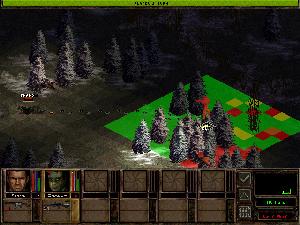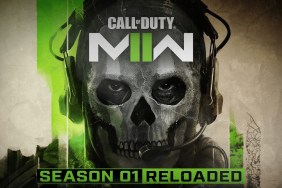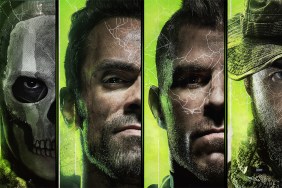Unfinished Story.
In the war-ravaged country of Arulco (just sub in the name of any extremely poor
South American country) peace starves, while strife and tyranny gorge themselves
on the bent backs of the natives.
As the fate of Arulco was ripped from the hands of ruthless despots by a brave
band of mercenaries and the civil war they ignited, so were rich Arulcan mines
snatched from Ricci Mining and Exploration. Once liberated, these mines fell
into the defenseless hands of the Arulcans. And now, Ricci Mining and Exploration
wants its mines back.
As you can see, plot isn’t a major element in Jagged Alliances 2: Unfinished
Business. No, this game, which is neither sequel nor expansion (I have no
idea what that makes it), goes straight for the balls with some of the toughest
turn-based combat this side of the Gulf of Mexico.
The game begins on your laptop, where you receive an e-mail from the distressed
Enrico Chivaldori, President of Arulco. From there you’ve got to use the money
he’s given you to scrape together a group of commandos worthy of the daunting
mission ahead: the dismantling of RM&E’s presence in Tracona.
To rustle up your commandos, you log on to the websites of either A.I.M or
M.E.R.C., two agencies who deal in the soldier of fortune trade. Even though
the M.E.R.C. site boasts an obnoxious little piss-ant host, the two sites only
differ in the mercs they have to offer.
The mercenaries vary in skills and prices and range from your typical stone-faced
military bad ass to a fat, incompetent hitman to a stereotypical French jerk.
As dull as the mercs seem at first glance, they prove to be pretty entertaining
and very well acted. They each have their own little catch phrases when they
ice a baddy, and a few of them have distinct personalities.
Unfortunately, as with most games involving a huge selection of NPCs, none
of these players develop or have any real issues or motives within the game.
Even though the characters have their little programmed quirks and the game
is mainly combat start to finish, it’d be nice if the mercs had more personality
than puppets and more significance than tools.
After choosing your team, you log onto a psychological profiling agency to
figure out who you are. Here you get to juggle stats for the ideal commando
leader. Unfortunately, the game doesn’t give you quite enough points to juggle,
leaving you with either a consistently mediocre player or an idiot savant. What
a choice!
And so the game opens with a beginning so difficult that all but the most
stalwart players will shrink from its nastiness. Before you really get into
it though, you’ve got to get yourself to the map screen.
JA2:UB‘s map is misleading and pointless for two main reasons. First
of all: you can only move one sector at a time. Every damned sector on the map
is full of enemies, and you can’t pass a sector until you’ve killed at least
a handful of the enemy. So, even though you can see where you’d like to be,
you can’t just click and go there, you have to truck it sector by sector.
And secondly, JA2:UB is very linear. There’s really no question as
to where you’re supposed to go and pretty much only one way to get there, making
a big map pointless.
When you’re not on the map screen, you’re in the regular isometric view in
one of the many sectors of the game, and you’re either kicking ass or buying
harder shoes for extra violent kicks to the enemy’s posterior.
Combat in JA2:UB is turned-based and begins when visual contact is
made between one of your guys and an enemy. Needless to say, you always want
to see the enemy first.
 Since
Since
there isn’t any way to regain health while you’re in the midst of combat, you
never want your guys to take a hit. As opposed to running into fights with guns
blazing, the player must figure out how to drop his mark without attracting
the attention of the target or any of his friends. This makes for a very subtle,
stealthy combat style, and battles which are more like puzzles than firefights.
While the combat is cool, after your first forty fights it gets slightly formulaic.
You send a dude out into the open to see where enemies are, then you reload
and kill them. Tons of saving and loading.
Though the enemy AI is fairly simple (especially on the easiest difficulty),
enemy placement is perfect. Some enemies are placed in perfect sniping points,
making them extremely difficult to root out and very rewarding to kill. JA2:UB‘s
tactical aspects are very intelligent.
The graphics, on the other hand, are totally dated. The entire appearance
of JA2:UB is unoriginal. It looks exactly like JA2, which in turn
looked a whole lot like the two Fallout games. The camera view is impossible
to manipulate, the colors are drab, and the details are sparse.
The animation is very plain and occurs on a small scale. However, there are
some pretty rockin’ death sequences with exploding heads and perforated bodies.
Sadly, none of the actual animations live up to the ideas. Most of the death
animations are slow and a lot of the gory details aren’t very detailed.
JA2:UB‘s sound is fantastic. The voices are clear and sharp, the weapon
firing effects are distinct and dynamic, and the background themes are perfect
for the suspenseful mood of the game. Having said that, if you select all your
troops and issue a command, the output gets garbled. This is made worse by the
fact that you have to issue lots of commands, making for a lot of “Okeah-huh”
and general “&%$#@.”
While JA2:UB‘s combat is unique and rewarding, nearly every other aspect
of the game lacks vitality and originality. The graphics are weak, there’s no
story, no character development, and the villagers never say anything but “They’re
watching you.” Any pleasure that might be derived from victory via some story
line or dialogue is lost, and all that follows one victory is another difficult
challenge. JA2:UB is a tough game, but not tough enough to overcome its
own mediocrity.

-
Tactically challenging
-
Sounds like a winner!
-
No story
-
No development
-
Visually dated







